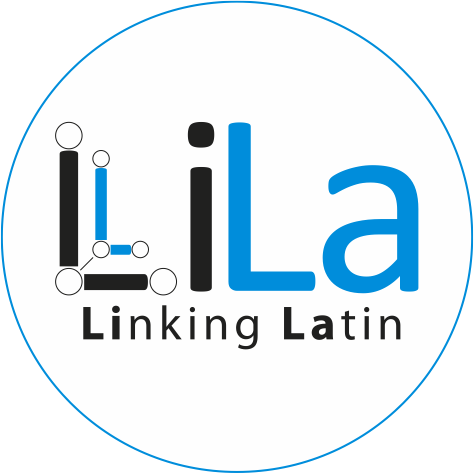MobiLab Winter School 2021 Mini-Tutorial
Linking Linguistic Resources to a lexically-based LLOD Knowledge Base
MobiLab 2021 Summer/Winter School
This mini-tutorial will be held during the Mobility & Humanities: Digital Experiences and Tools Summer/Winter School (MobiLab 2021).
Date and time of the activity
Wednesday, 1/Dec/2021, 10:00 am – 11:30 am (CET)
Location
Online.
Description
The tutorial aims to introduce the architecture, use, and enhancement, of the LiLa Knowledge Base of interlinked linguistic resources for Latin, developed in the context of the LiLa: Linking Latin project. In particular, the tutorial will present how the Linked-Data model adopted by LiLa is used to connect distributed lexical and textual resources, to ensure their interoperability. We show how, via lemmatisation, texts become part of this network of resources. We provide participants with a theoretical introduction to the architecture of LiLa, as well as hands-on support in their interaction with the LiLa Knowledge Base. The proposed tutorial falls within the field of Linguistic Linked Open Data (LLOD). While we focus on Latin, the methods discussed are language independent and thus have a much wider application, proving useful for similar initiatives on other languages. Starting from the experience of LiLa, we introduce the audience to some of the most relevant topics in current digital textual studies and linguistic resources, including:
- Language (Meta)data. Tools and techniques of linguistic annotation. Specific concepts and technologies discussed: tokenisation, part-of-speech tagging, lemmatisation, and application of a Natural Language Processing (NLP) pipeline with specific models trained on a large Latin corpus.
- Knowledge Graphs. Tools and techniques to interoperably link linguistically-annotated datasets. Specific concepts and technologies discussed: interoperability standards, ontologies, RDF, SPARQL, Linguistic Linked Data.
- Use Cases in Language, Data and Knowledge. Possible uses for philology and linguistics namely searches combining etymology, polarity, frequency, (graphical) variation, meaning, and more.
Materials and technical requirements
The text and tools necessary to participate in the event are provided by the LiLa team before and during the tutorial. The tutorial is designed to work with desktop computers and laptops, *not* tablets or smartphones.
Github repository for the tutorial material.
